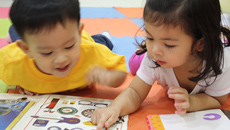A significant religious festival in Indian culture, Diwali sees millions attend firework displays, prayers and celebratory events across the world on this day every autumn.
The Festival of Lights, commonly known as Diwali or Deepavali in India and in countries all over the world, is the most important festival for Indians. The celebrations signify triumph of good over evil, purity over impurity and light over darkness.
A significant religious festival in Indian culture, Diwali sees millions attend firework displays, prayers and celebratory events across the world on this day every autumn.
Apart from India, Diwali is also celebrated in a big way by the diaspora in Britain, the USA, Canada, Australia, Bangladesh, Bhutan, Thailand, New Zealand, Tanzania, South Africa, Netherlands, Canada, and Ireland. Apart from India, countries having an official holiday for Diwali are Fiji, Guyana, Kenya, Malaysia, Mauritius, Myanmar, Nepal, Singapore, Sri Lanka, Suriname, and Trinidad and Tobago.

Diwali holds significance not only for Hindus but also for followers of Sikhism and Jainism. Sikhs celebrate it as Bandi Chhor Divas (Prisoner Release Day) to commemorate the release of their sixth guru, Guru Hargobind along with 52 Rajput princes from Mughal Emperor Jahangir’s custody.
Celebrations include lighting of candles at gurdwaras, singing Shabads (sacred songs) in praise of the Guru, Langar (free meal served to visitors at community kitchens in gurdwaras), and bursting of fireworks.
Jains celebrate it as the day when the 24th and last Jain Tirthankara Lord Mahavira, attained Moksha, that is, liberation of the soul. Lord Mahavira attained Moksha at Pawapuri in the Nalanda district of Bihar at the dawn of the Amavasya (new moon).

The presence of many Gods on the occasion illuminated the darkness. The following night was pitch-black, so people light up their houses to symbolically keep the light of their Master’s knowledge alive.
The five-day Festival of Lights coincides with the Hindu New Year. Dhanteras marks the beginning of the five-day festivities. It is an auspicious and lucky day for buying expensive goods, also a day to offer charity.
The second day, Naraka Chaturdashi, is celebrated as the main day of Diwali in parts of South India as it is said that the demon Narakasura was killed on this day. On the third day most parts of India celebrate Diwali on this day.

The fourth day, first day of the New Year in the Hindu calendar, is known as Goverdhan Puja. On this day Lord Krishna lifted Govardhan Hill to shelter villagers from torrential rains. As a tribute, food is prepared for distribution. Bhai Dooj, on the fifth and last day, celebrates strengthening of ties between brothers and sisters.
Welcoming Lakshmi, the Goddess of Wealth and Prosperity, many Indians decorate their homes with diyas (small clay lamps) or candles, draw colourfully designed rangolis in their courtyards, make sweet dishes and other tempting foods to offer and exchange with the family and guests.

Gujaratis consider it the ideal time to make new investments in commerce and real estate or launch a new business venture. In Maharashtra people begin Diwali festivities by worshipping a cow and its calf to celebrate the bond of motherhood.
Another practice in most parts of South India is the ritual bath in scented oils before visiting the temple. In Andhra Pradesh, prayers are offered to Lord Krishna’s consort who is said to have killed the demon Narakasura.
Here’s wishing all readers of Darpan a Very Happy Diwali.
Arun Wali is the senior vice-president of AB Smart Concepts, a hotel, travel and tourism consultancy company in New Delhi, India, and a journalist with over 40 years of experience.






